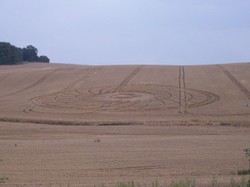A world-view is your understanding of the kinds of beings that there are in the world and the kinds of causes that operate within it. It includes the whole general account of how the cosmos operates on the broad scale of how the cosmos began and the local scale of the role of evolution in the development of life on Earth. The creationists's world-view excludes evolution.Whether or not there is a deity and the identity of this deity are part of a world-view, as is how the deity relates to this world, whether He/She can act within it and if so in what ways. Linked to any world-view is a theory of knowledge, for it is from this theory of knowledge that we decide what we can know of the world and what we cannot.
Everyone has a world-view, but it can be well thought-out and theoretical or unreflective, and there can be many shades between. But the obligation on us all is to proceed in developing a world-view in a spirit of complete open-mindedness. We must gather as wide a range of phenomena as we can, however strange and analyse them objectively, and we must be sensitive to the philosophical assumptions and the theory of knowledge we bring to bear on our investigations. We must never say to ourselves, "I know all the beings that there are in this world and all possible worlds." We don't, and if we did the only way in which we could know them is to have thoroughly examined all possible worlds, which none of us have done. So our world-view is or always should not be final, but a work in process.
The problem is that the thinkers of the enlightenment did not do this. They took the already limited philosophy of Cartesianism, which limited reality to mind and matter, and got rid of mind. They limited knowledge to mathematics and empirical science known through the senses, and rather than gather a wide range of phenomena from across the world to be explained they hardly worked outside the confines of France, Paris in particular. Hardly the basis for a complete world-view, but this limited materialistic world-view has been promulgated across the planet, excluding or explaining away phenomena that challenge it. While we rightly criticize the church for its misbehaviour in the Galileo case, this even bigger aberration is still current and well-established in the world. Thought has been in a straitjacket because of this narrow materialism.
It is not that paranormal phenomena are explained ignored, the technique is to perform the intellectually dishonest act of explaining them away. This is done by questioning the intelligence or mental competence of those who experience them. Such questioning relies on the assumption that all who genuinely experience something paranormal are deluded either about what they saw or the explanation. You saw a ghost, trick of the light, you had been drinking, on drugs, under stress. Or you are lying! Perhaps you have a hidden agenda. But the trouble with the skeptic is that he/she is skeptical about everyone but themselves. Never do we hear any admission that these skeptics might be wrong.Too often demands for open mindedness are for other people only.







 Darkness over the Earth the skies darkened when Jesus was crucified12 days ago
Darkness over the Earth the skies darkened when Jesus was crucified12 days ago
 TheThousand Year Gardenon 11/26/2025
TheThousand Year Gardenon 11/26/2025
 Women of the Gospelson 10/11/2025
Women of the Gospelson 10/11/2025
 Religious Gardenson 08/25/2025
Religious Gardenson 08/25/2025



Comments
The mediavals distinguished preternatural and supernatural events, though moderns lump them both in the supernatrial category. Jesus, as a divine being, worked supernatural happenings a mystic who has learned to levitate works a preternatural event, as he/she is not divine. However, a prophet who performs a miracle in God's name and through his power performs a miracle, as God is working through him..
Thank you for your comment below, on Apr 7, 2024, in answer to my previous, previous-day observation and question.
The Endor medium raising Samuel's ghost somewhat causes me to consider Jesus Christ raising the dead Lazarus.
Please do not consider me blasphemous -- not my intent, but my apologies even if unintended -- in this description below (as not what I necessarily entertain other than as a question).
Is raising the dead Lazarus a paranormality that Jesus Christ initiated even as He is the undeniable implementer of many miracles?
The medium of Endor who raised Samuel's ghost.
Some online sources describe paranormal as interfacing between two worlds.
Might there be any example or suggestion of paranormal in the Bible?
There are so many issues wrapped up in this comment that I would need to do much reflection, and it is worth an article which touches on these issues.
The first paragraph to your first subheading, The Conceptual Dustbin, considers such varied "paranormal" occurrences as experiencing near-death and recalling past lives.
How would analysis and research handle a mix of such occurrences? Would it not be possible for someone in near-death to experience past-life or to interact with a yeti or to witness telekinesis?
Would a dreamed interaction, such as with a dead parent who comforts or helps or reminds or warns, be considered "just" a dream or a "paranormal" happening?
Protestantism believes in only two destinations, heaven and hell, with nothing in between, whereas Catholicism accepts an intermediate state called purgatory. As one intermediate state is accepted, there is room for others..
Why is Protestantism different from Catholicism and Orthodoxy in that respect?
I wrote a review of Beyond the Ashes, which deals with reincarnation memories, that's what you are thinking of. Christianity was not at first against reincarnation, it was only at the second council of Constantinople that the Emperor Justinian interfered in religious matters and got belief in the pre-existence of souls outlawed. Until then there were many reincarnationists in the church, including Origen and Clement of Alexandria.
My personal view is that the afterlife is more complex and subtle than the simple heaven hell purgatory model invented [I use the term advisedly] by the clergy, who have concocted a Christian doctrine to give substance to Jesus' promise of eternal life. Jesus, however, did not give us any details about how the promise was to be fulfilled. He merely promised eternal life to his followers. We have a very clever deity, but we are expected to believe that this superintelligent being could only think up a simplistic heaven hell model for the afterlife. I think that there is far more to it than we have ever dreamed of, and we have much to learn.
But even if reincarnation were proved, Catholicism and Orthodoxy would not collapse, though Protestantism would take a deadly hit.
I read a little about Ian Stevenson and Rupert Sheldrake after reading your comment. It's interesting. The problem is, if you accept reincarnation, the door is open to so much more. Christian clergy is adamant against reincarnation. The whole edifice crumbles if you accept that, doesn't it? I don't know what to think about it. What do you think about it? In fact, I seem to recall you wrote an article on it.
P.S. You didn't, actually. I don't know why I thought that you did.